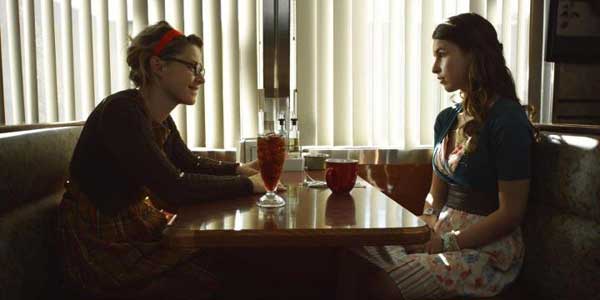

Click here to read the best of Day 1
Douglas Horn’s Coffee and Pie is a short film about a break up at a diner. The manipulative June has decided that her interest in girlfriend October has peaked and left. Now she goes through her well-practiced motions, as October rolls over to take it. Then Billie-Jean, a kind waitress, offers October some apple-pie and advice. This upends the balance of power, letting October teach June a lesson about control.
The self-proclaimed anti-comedy transposes old clichés onto a lesbian couple and plays out in scripted fashion. Too much has been crammed into 16-minutes, making the turning of the tide a little contrived. A good performance by the actress playing Billie-Jean is the highlight, but it is a retelling of a story we have all heard before. The improv dialogue is realistic enough, and the actors aware of their purpose within the narrative making the story-telling tight. However, the characters are too shallow to truly engage with, and more genuine emotion would be a welcome addition.

Polaroid Girl – Director: April Maxey
Polaroid Girl, by April Maxey, follows the introverted and awkward Sofie, an aspiring photographer in New York. Getting nowhere at work, being trampled by her boss and subject to lecherous men on the streets, a chance meeting with June transforms Sofie’s confidence.
The film is very cute to start off, and Sofie’s awkwardness is heart-warming and entertaining as she tries to get close to June, in a Michael Cena-esque way. The film is well put together, and the two main characters have good depth. The characters seem very ‘hipster’, fitting well into the setting of New York. Combining this with Sofie’s pretentious photography, however, and it’s difficult to engage with her and her world. She never seems that hard up to earn our sympathy.
There are plenty of ‘cringe’ and ‘aww’ moments to keep it light. However, when Sofie goes from titch to bitch, her new found security makes her treat people badly; even those who were good to her before do not escape her wrath, making her instantly unlikeable. This is a shame when so much of the film was committed to make her endearing.

Jackpot – Director: Adam Baran
Jackpot is a breath of fresh air. A 14-year-old boy is interrupted from a moment of self-pleasure by a phone call from his friend. The news of a stash of gay pornography being found leads the protagonist to rush out and hunt it down. Upon discovering the bounty he is visited by the apparition of one of the models in ‘Jackpot’ magazine, who helps him overcome the bullies who aim to ruin his day.
The story of a boy hunting down pornography to give himself a good time, and the introduction to his imaginary friend was quite a surprise: a very pleasant one. I’ve never seen a film with such a fresh (and silly) concept! And one executed so well? Get out of here! The production of the film suits the narrative so well, with fast cuts, outrageous costumes and vibrant colours. The boy taking a stand against the bullies shows this film also has an important message for its audience. Surprisingly tasteful given the subject matter, this film swaggers with confidence and shows off director Adam Baran’s high professional standards. The timing is impeccable. It is the most fun I have had watching a short film.

Daddy Issues – Director: Carolina Roca-Smith
Another comedy, in the form of Daddy Issues, plays out a date which goes from innocent curiosity to downright awkward personal examination. The two characters ask increasingly intimate questions while commenting on each other’’ ‘nice facial structure’ and ‘good breasts’. The humour and charm are delivered well in Carolina Roca-Smith’s short film, as the true intent of the couple unveils before you. Some jokes retold, the comedy is good and the intrigue, while not completely obvious, keeps you eager for the punchline.
The players do well and the audience share their fun as the dialogue becomes more and more ridiculous. That is until the punchline is delivered and an attempt at sentimentality undermines the first act. Although the film’s message is awkwardly delivered at the end, you will find the couple endearing and enjoy the silliness of it all.

Reprise – Director: Shripriya Mahesh
Reprise, by Shripriya Mahesh, tells the story of Meena as she faces her daughter leaving home, all the while dealing with a long-running abusive relationship with Sarah. The cinematography in this short film is incredible, with mesmerising ultra-close-ups, and luscious colours. Technically well-crafted, the narrative is ambiguous and the audience is left to figure out the characters motivations.
However, Meena comes across as bland: she seems to be portrayed as faultless and perfect, but she ends up being uninspiring. This makes her rather unsympathetic and difficult to engage with. While the protagonist is not very endearing, and the abuser clichéd at times, the film does well to portray the ups-and-downs of an abusive relationship, the bi-polar nature of the abuser, and the magnanimity of the victim.

The Arrival – Director: Christian Kotey
Christian Kotey’s The Arrival began life on stage. The troupe of actors and friends set out to make people fall into hysterics. With snappy edits and a cast hell bent on cracking you up with larger than life characters who seem completely unaware of the rules of this world. It makes the comedy fresh, and the detachment allows you to laugh at a woman attempting to scam two gay men who are looking to purchase a baby.
The Irish troupe deliver snappy lines in a film reminiscent of the phone-call interview scene from Mrs Doubtfire, as the scam-artist impersonates a series of inappropriate candidates to ensure the gay couple adopt her fake baby. Punchy lines and strong, lively performances show a passion for telling a funny story, and this makes up for over long shots and stuttering moments where the improv has fallen short. It’s not seeking to redefine genres or win awards for pretentious cinematography, it’s just good fun well delivered.

What Katy Did – Directors: Tanja Wol Sorensen & Gussy Sakula-Barry
The essence of any good documentary is a gripping subject. Katy Went, a ‘lazy trans queer dyke’ is a shining example in What Katy Did. Katy opens up her life to two young filmmakers, Tanja Wol Sorensen & Gussy Sakula-Barry, sharing her struggles to come to terms with her sexuality, and her mission to realise her true self. The film tells Katy’s story very well, it is quirky, touching and utterly endearing. The film-makers do well to portray the struggles faced by trans-gender individuals. A scene at one of Katy’s parties throws out any preconceptions and makes you smile as you fall in love with each character, just looking to live life by their terms.
The film-making itself is basic, but it never distracts you from the most important element: Katy herself. On two occasions, however, both Sorensen and Sakula-Barry film themselves (or reflections of themselves) and this completely spoilt their efforts for me.
Writer: Adrian Naik
Leave a Reply (if comment does not appear immediately, it may have been held for moderation)